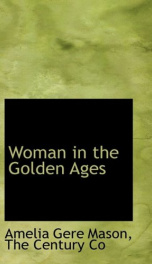woman in the golden ages

Purchase of this book includes free trial access to www.million-books.com where you can read more than a million books for free. This is an OCR edition with typos. Excerpt from book: conclusions entitled him to more consideration than he received from the women of his time. But this rapid glimpse will suffice, perhaps, to show the spirit in which latter-day questions were treated four or five centuries ago; also to throw a strong light on the position of women during the period, without very precise limits, known as the Renaissancea period of special interest to us, as it marks the dawn of a new era of feminine intelligence. We do not know how it happened that Bitisia Gozzadina stepped out of the traditional seclusion of her sex as early as the benighted thirteenth century, to be made doctor of civil and canon law in the (jniversity of Bologna at the age of twenty- seven. She had already pronounced a funeral oration in Latin and otherwise distinguished herself several years before. It is no longer the fashion to give Latin orations outside of the universities, but we know how women fared a few decades ago, when they tried to speak publicly in their own language. It was perfectly understood that women of such oratorical proclivities forfeited all right to social consideration. They were practically ostracized. Happily, now they are treated about as well as they were six hundred years ago, when people crowded the university halls and eventhe public squares to listen to this remarkable woman. We do not hear that she was called any disagreeable names, not even a bas-bleu, though there is a vague tradition that she had peculiar notions about dress. It is said that she had rare beauty, but her charm and esprit made people forget it. There is nothing in the medieval ideals of womanhood to suggest such a phenomenon, still less its cordial acceptance. Not even in the early poets is there a trace of the type of woman which played so distinguished a part in the go... --This text refers to the Paperback edition.
Info about the book
Author:
Series:
Unknown
ISBN:
0061999237
Rating:
4.5/5 (2)Your rating:
0/5
Languge:
English
Users who have this book
Users who want this book
What readers are saying
What do you think? Write your own comment on this book!
write a commentif you like woman in the golden ages try:
Other books by this author
Do you want to read a book that interests you? It’s EASY!
Create an account and send a request for reading to other users on the Webpage of the book!

